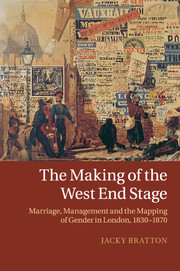 The Making of the West End Stage
The Making of the West End Stage Chapter 3 - Bohemian domesticity: the city of the mind
from Part I - Mapping
Published online by Cambridge University Press: 05 November 2011
Summary
The mapping and guiding of Chapters 1 and 2 moved from the material – walking the streets – towards the conceptual – a textual negotiation of the layers of class interpellation, the spinning and gatekeeping of the press. These two layers tended to demonstrate that the West End is as much in the mind as on the streets of London; it is an idea about a space, the special and elusive place that is the goal of dreams of pleasure, of admission or exclusion, figuring both disappointment and desire. This third topographic take on the making of West End theatre is a final step into spatial abstraction, exploring Bohemia, the city of the mind, where the performances were made. It seeks to understand how the stage community, and specifically those who wrote for performance, understood their own position in the world, and how women operated and were understood in that imaginary sphere. I have stressed the importance of a class-based understanding of British identity, pleasure and recreation, with in the background Walter Benjamin's conception of the Parisian Arcades as representing in fantastic form the collective dream consciousness of pleasure, distorted by class oppression but still a necessary basis of human change and progress, and using Raymond Williams's stratification of culture into residual, dominant and emergent strands. Twenty-first-century ideas about class, however, are inflected by concepts of differentiation and difference that go beyond the foundational Marxist and post-Marxist analyses, to questions including the gendering of rank and power. I hope the female players so far noted are evidence that women had an important role in the economy of the West End. Here I shall explore the psychic, and consequently the historiographic, barriers to the recognition of that importance. The walkers in Chapter 1 were a woman, and a journalist; here I will look at the overlap between these two categories, not simply in terms of embodiment – there were many female writers for the periodical press – but in terms of class definition and identity conflicts for the male Victorian writer.
- Type
- Chapter
- Information
- The Making of the West End StageMarriage, Management and the Mapping of Gender in London, 1830–1870, pp. 86 - 114Publisher: Cambridge University PressPrint publication year: 2011


